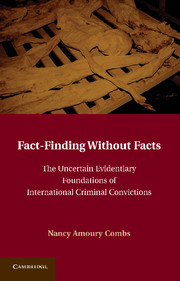 Fact-Finding without Facts
Fact-Finding without Facts Published online by Cambridge University Press: 05 October 2010
THE PREVALENCE OF EYEWITNESS TESTIMONY
Although the Nuremberg trial provides the legal, theoretical, and normative underpinnings for today's international criminal proceedings, it does not stand as their evidentiary model. The high-level Nazi officials who were prosecuted at the Nuremberg Tribunal were convicted on the strength of their own documentation. Nazi leaders kept meticulous written records; as one Nuremberg prosecutor put it: “These Nazis had a mania for writing things down. It is an amazing psychological phenomenon that not one of these men could have a minor political conversation without recording it.” Recognizing that witnesses had fallible memories and might collapse under cross-examination, lead prosecutor Robert Jackson decided to use witnesses sparingly and instead to base his prosecution of the Nazis almost exclusively on their own documents. Nuremberg prosecutors reviewed approximately one hundred thousand documents, and they presented a substantial proportion of these to the Tribunal: The prosecution put 331 documents into the record during the first four hours of the Nuremberg trial, and it submitted many thousands of documents during the trial as a whole.
Unlike the leaders of Nazi Germany, who meticulously documented their illegal acts, the architects of more recent atrocities have left few written records, and what written records they did leave often are not made available to prosecutors. Consequently, the vast bulk of the evidence presented to the current international tribunals comes in the form of witness testimony.
To save this book to your Kindle, first ensure no-reply@cambridge.org is added to your Approved Personal Document E-mail List under your Personal Document Settings on the Manage Your Content and Devices page of your Amazon account. Then enter the ‘name’ part of your Kindle email address below. Find out more about saving to your Kindle.
Note you can select to save to either the @free.kindle.com or @kindle.com variations. ‘@free.kindle.com’ emails are free but can only be saved to your device when it is connected to wi-fi. ‘@kindle.com’ emails can be delivered even when you are not connected to wi-fi, but note that service fees apply.
Find out more about the Kindle Personal Document Service.
To save content items to your account, please confirm that you agree to abide by our usage policies. If this is the first time you use this feature, you will be asked to authorise Cambridge Core to connect with your account. Find out more about saving content to Dropbox.
To save content items to your account, please confirm that you agree to abide by our usage policies. If this is the first time you use this feature, you will be asked to authorise Cambridge Core to connect with your account. Find out more about saving content to Google Drive.